- Home
- Prelims
- Mains
- Current Affairs
- Study Materials
- Test Series
Trawling Tensions: Navigating the India-Sri Lanka Palk Bay Dispute
The India-Sri Lanka fishing dispute in the Palk Bay is a complex issue involving traditional fishing rights, ecological concerns, and diplomatic tensions. The Palk Bay, a narrow strip between Tamil Nadu and Sri Lanka, is a historically shared fishing zone, but the International Maritime Boundary Line (IMBL) divides it, leading to frequent arrests of Indian fishermen by the Sri Lankan Navy for crossing into Sri Lankan waters. The core of the conflict is the practice of bottom trawling by Indian fishermen, which is banned in Sri Lanka due to its destructive effects on marine biodiversity and coral beds, worsening ecological damage and sparking cross-border tensions.
 Core Issues
Core Issues
- Trawling Practices: Indian fishermen, particularly from Tamil Nadu, use bottom trawlers that damage marine ecosystems and deplete fish stocks. This has led to resentment among Sri Lankan fishermen who rely on traditional fishing methods.
- Legal and Sovereignty Concerns: The 1974 and 1976 maritime boundary agreements between India and Sri Lanka ceded Katchatheevu Island to Sri Lanka and prohibited Indian fishing in Sri Lankan waters. However, Indian fishermen continue to cross the IMBL, citing historical rights.
- Arrests and Detentions: Frequent arrests of Indian fishermen by the Sri Lankan Navy have strained bilateral relations and caused humanitarian concerns.
Diplomatic and Policy Responses
- Joint Working Groups (JWG): India and Sri Lanka have established JWGs to address the issue, but progress has been slow.
- Alternative Livelihoods: The Indian government has proposed deep-sea fishing schemes to transition fishermen away from trawling, but implementation has been inadequate.
- State vs Centre Dynamics: Tamil Nadu’s political leadership often pressures the Centre to take a hardline stance, complicating diplomatic efforts.
Way Forward
- Sustainable Fishing: Transitioning to deep-sea fishing and phasing out trawlers is essential for ecological balance and long-term livelihoods.
- Bilateral Cooperation: Strengthening institutional mechanisms and ensuring consistent dialogue can help de-escalate tensions.
- Community Engagement: Involving fishing communities from both sides in confidence-building measures is crucial for lasting peace
In summary, resolving this vexatious dispute requires a multi-pronged approach: diplomatic negotiations focused on sustainable practices, regulatory reforms banning harmful methods like bottom trawling, facilitating legal cross-boundary fishing, and supporting fishermen''s livelihoods. This issue is not merely about maritime boundaries but embodies broader themes of environmental conservation, regional diplomacy, and socio-economic sustenance of fishing communities in India and Sri Lanka.









 Latest News
Latest News
 General Studies
General Studies